During Advance CTE’s 2023 Fall Meeting, four members of the second cohort of the 15-month Postsecondary State Career Technical Education Leaders Fellowship at Advance CTE – Sponsored by ECMC Foundation participated in a panel discussion to share their experiences and knowledge gained from the Fellowship, as well how state Career Technical Education (CTE) leaders can remove barriers for diverse aspiring postsecondary leaders.
Jomarie Coloriano – Inclusive Excellence, Director | Office of Diversity, Equity and Inclusion, Wisconsin
Dr. Crystal Gardner – Program Director | Workforce Instruction, Workforce Research and Development | Houston Community College, Texas
Dr. Angela Lawhorne – Director of Career Education Programs & Workforce Partnerships | Virginia Community College System, Virginia
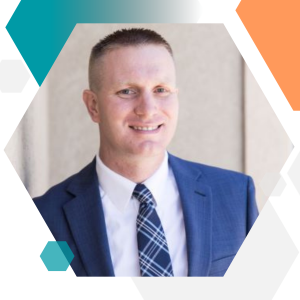
Caleb Perriton – Program Director | Trades and Technical Studies | Laramie County Community College, Wyoming
Fellows shared their reasons for applying to the Fellowship, which ranged from seeking out leadership opportunities to advance at their current institution to being forwarded the application by a colleague or a supervisor who believed and supported their leadership aspirations. A common theme shared by each was the desire to address a specific concern related to policy and processes within postsecondary Career Technical Education (CTE). The application for the Fellowship included a question on future goals and a challenge related to equity and a population of learners applicants wanted to research and develop an intervention for while completing the Fellowship. The Fellows pointed to the intentionality of explicitly requiring applicants to reflect on and consider CTE leadership opportunities and the inclusion of an equity-based real-world project made the decision to apply an easy choice.
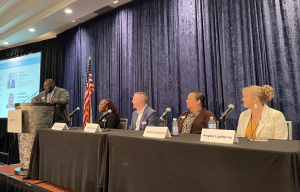 Fellows were also asked to share the key event or events that reinforced their decision to apply to the Fellowship, in other words – when they knew they made the right decision. Dr. Gardner shared that in CTE she rarely has an opportunity to work with or collaborate with other leaders of color across the nation and view the entire landscape of leadership possibilities in postsecondary CTE. The Fellowship offered an opportunity to build a network consisting of her peers, guest speakers invited to the Fellowship workshop and most importantly her coach whom she felt she was perfectly matched with based on their commonalities and interests. She recognized the level of thought the Advance CTE staff dedicated to finding the right mentor for each of the Fellows. Caleb discussed being paired with a postsecondary administrator with an automotive background and how the monthly coaching meetings inspired him to begin seeking the director position he currently holds at his institution.
Fellows were also asked to share the key event or events that reinforced their decision to apply to the Fellowship, in other words – when they knew they made the right decision. Dr. Gardner shared that in CTE she rarely has an opportunity to work with or collaborate with other leaders of color across the nation and view the entire landscape of leadership possibilities in postsecondary CTE. The Fellowship offered an opportunity to build a network consisting of her peers, guest speakers invited to the Fellowship workshop and most importantly her coach whom she felt she was perfectly matched with based on their commonalities and interests. She recognized the level of thought the Advance CTE staff dedicated to finding the right mentor for each of the Fellows. Caleb discussed being paired with a postsecondary administrator with an automotive background and how the monthly coaching meetings inspired him to begin seeking the director position he currently holds at his institution.
Each of the Fellows discussed the impact of their real-world project and the effect of completing the project has had on their current work and aspirations to continue climbing the postsecondary CTE leadership ladder. Dr Lawhorne’s project focused on improving access to justice-involved learners in Virginia and the state’s current efforts to expand, through the community college system, access to high-quality CTE programming. In the process of completing her project, an award of $70,000 was granted to support the project which allowed for the inclusion of other correctional facilities in the intervention strategy being implemented at a few select sites in the state.
As part of Jomarie Coloriano’s project research on providing information on and access to wrap-around services for economically disadvantaged learners in her region of the Wisconsin Technical College System, she conducted a focus group which led to the identification of learner needs. This work led to an advancement to director as she continues to complete her doctoral program and the continuation of her research on increasing the postsecondary outcomes of economically disadvantaged learners. Jomarie shared during the panel discussion, “my mentor has really pushed me as a college student, first generation professional, now a doctoral student and pioneer for my family.”
This panel allowed CTE leaders to see the impact and influence of leadership development programs. Caleb shared with the state leaders that “there’s work that needs to be done in your state, and this Fellowship was the catalyst to complete a project that was needed in my community.” State and local CTE leaders can use Advance CTE’s new Building a Diverse CTE Leadership Pipeline Toolkit, to assess and build leadership development structures in their own institutions. The resource includes an overview of lessons learned from the Fellowship as well as a guidebook and accompanying workbook to assess and build leadership development structures.
Dr. Kevin Johnson, Senior Advisor


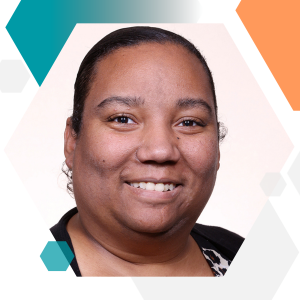


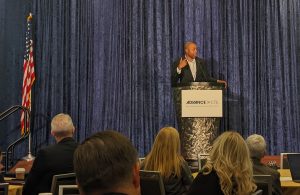 Our keynote speaker was Chike Aguh, an
Our keynote speaker was Chike Aguh, an 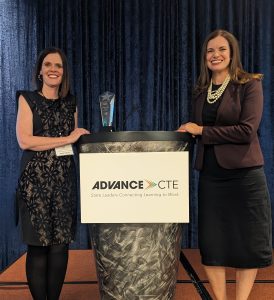
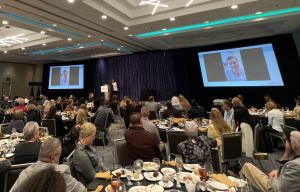
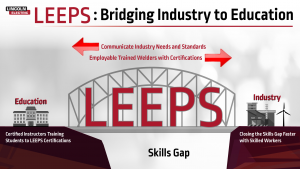 How do we continue progress in this country without the skilled tradespeople to do the job? It is ever more imperative that industry leaders and business owners need to work collaboratively with education institutions to ensure the training learners receive is in step with what the industry needs. While there are many paths to filling these jobs, from providing on-the-job training, upskilling current workers or adding automation to the production line, communication between Education facilities and industry must be ongoing to respond to constantly changing needs.
How do we continue progress in this country without the skilled tradespeople to do the job? It is ever more imperative that industry leaders and business owners need to work collaboratively with education institutions to ensure the training learners receive is in step with what the industry needs. While there are many paths to filling these jobs, from providing on-the-job training, upskilling current workers or adding automation to the production line, communication between Education facilities and industry must be ongoing to respond to constantly changing needs. When learners earn an industry certification, they’re not just earning a credential for their resume. They’re also potentially saving money on higher education. It’s no secret that pursuing higher education in the United States comes at a high cost to learners. According to
When learners earn an industry certification, they’re not just earning a credential for their resume. They’re also potentially saving money on higher education. It’s no secret that pursuing higher education in the United States comes at a high cost to learners. According to 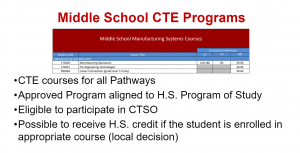 Career advising and development supports geared towards middle grades learners to improve access and achieve high-quality and equitable secondary CTE programs prove to be an early opportunity to develop an occupational identity and better build social capital. Ohio discussed the policy structures the state has put into place to support learners in CTE programs before they enter high school, including funding mechanisms and alignment of middle grades programs of study. Michigan Advance CTE-ECMC Fellow
Career advising and development supports geared towards middle grades learners to improve access and achieve high-quality and equitable secondary CTE programs prove to be an early opportunity to develop an occupational identity and better build social capital. Ohio discussed the policy structures the state has put into place to support learners in CTE programs before they enter high school, including funding mechanisms and alignment of middle grades programs of study. Michigan Advance CTE-ECMC Fellow 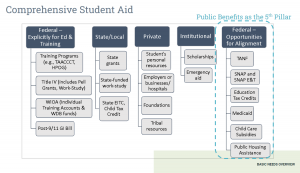 An education consultant and a state leader from Wisconsin provided an overview of programs that support learners basic needs, while elevating that many programs still create barriers for learners to complete credentials. Immediate next steps that were shared included making integrated benefits applications for federal assistance programs available online and inviting benefits coordinators to provide services on campus. Wisconsin highlighted their steps to create affinity groups with faculty and staff, with Dr. Colleen McCabe stating “To understand the effects of poverty, you have to explore learners’ multiple identities.”
An education consultant and a state leader from Wisconsin provided an overview of programs that support learners basic needs, while elevating that many programs still create barriers for learners to complete credentials. Immediate next steps that were shared included making integrated benefits applications for federal assistance programs available online and inviting benefits coordinators to provide services on campus. Wisconsin highlighted their steps to create affinity groups with faculty and staff, with Dr. Colleen McCabe stating “To understand the effects of poverty, you have to explore learners’ multiple identities.”
 Entry into the MOS and Adobe Championship differs. To enter the MOS Championship, students can participate in the Championship by taking a qualifying Microsoft Office Specialist certification exam and entering their score into the MOS World Championship. There are two qualification periods: the Fall and Spring. At the conclusion of each qualification period, competitors with the top scores will be invited to compete at the MOS US National Championship.
Entry into the MOS and Adobe Championship differs. To enter the MOS Championship, students can participate in the Championship by taking a qualifying Microsoft Office Specialist certification exam and entering their score into the MOS World Championship. There are two qualification periods: the Fall and Spring. At the conclusion of each qualification period, competitors with the top scores will be invited to compete at the MOS US National Championship.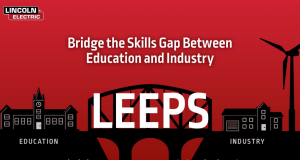 There is a welding skills gap, and that could actually mean a couple different things: It could mean there simply are not enough skilled welders to fill the welding careers available, or it could mean there is a disconnect between the skills employers are looking for and the skills applicants actually have. Either way, this gap existing is a real problem in the welding industry today—for both employers and job-seeking welders.
There is a welding skills gap, and that could actually mean a couple different things: It could mean there simply are not enough skilled welders to fill the welding careers available, or it could mean there is a disconnect between the skills employers are looking for and the skills applicants actually have. Either way, this gap existing is a real problem in the welding industry today—for both employers and job-seeking welders. 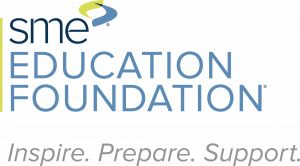 In the next decade, job seekers in manufacturing will find plenty of openings. It’s projected that nearly 3.5 million manufacturing jobs will need to be filled in the next 10 years. The challenge, however, is that there aren’t enough qualified workers to fill the positions. An aging workforce, changing technologies, and misperceptions about the industry all contribute to the shortage. This has serious consequences for the manufacturing industry, which is overwhelmingly not prepared. In fact, nearly nine out of 10 manufacturers say that their company is having problems finding skilled workers in manufacturing.
In the next decade, job seekers in manufacturing will find plenty of openings. It’s projected that nearly 3.5 million manufacturing jobs will need to be filled in the next 10 years. The challenge, however, is that there aren’t enough qualified workers to fill the positions. An aging workforce, changing technologies, and misperceptions about the industry all contribute to the shortage. This has serious consequences for the manufacturing industry, which is overwhelmingly not prepared. In fact, nearly nine out of 10 manufacturers say that their company is having problems finding skilled workers in manufacturing.  By nature, educators are deeply attuned to the needs of their learners—and often even the needs of their families. But these days, many educators are navigating how to respond to the often-increased needs and greater numbers of crises within (and sometimes outside of) their classroom ecosystems. Where is the game plan for—as we are frequently reminded—these unprecedented times?
By nature, educators are deeply attuned to the needs of their learners—and often even the needs of their families. But these days, many educators are navigating how to respond to the often-increased needs and greater numbers of crises within (and sometimes outside of) their classroom ecosystems. Where is the game plan for—as we are frequently reminded—these unprecedented times? Holly Atha,
Holly Atha, 
